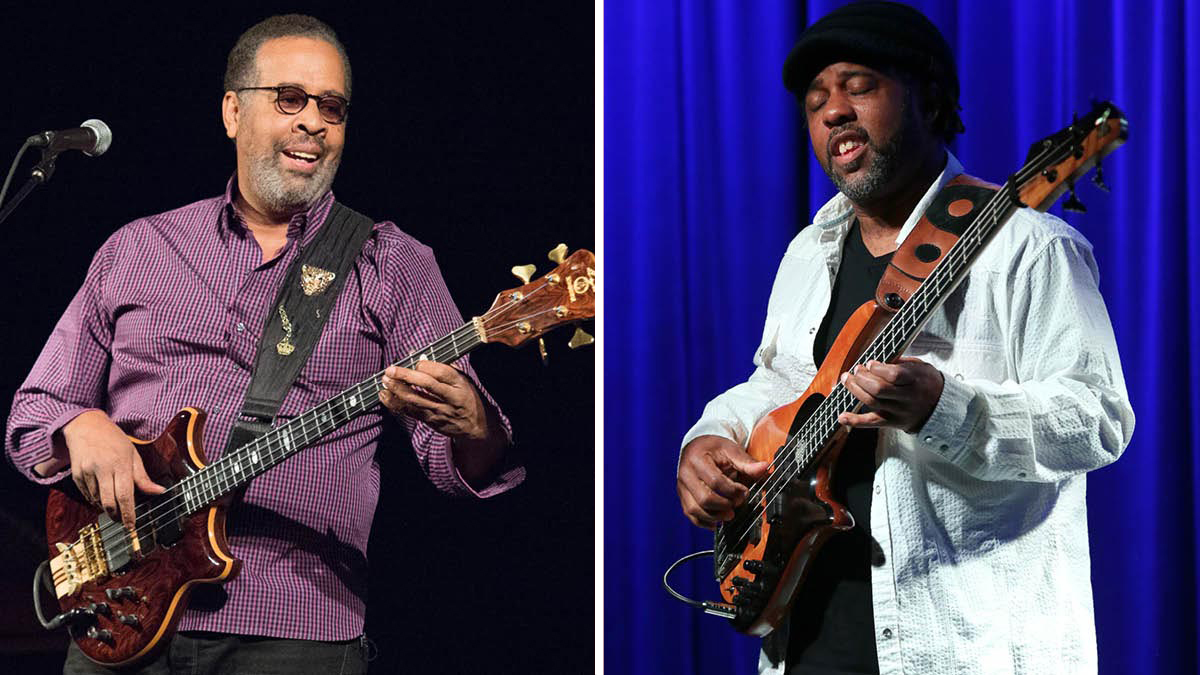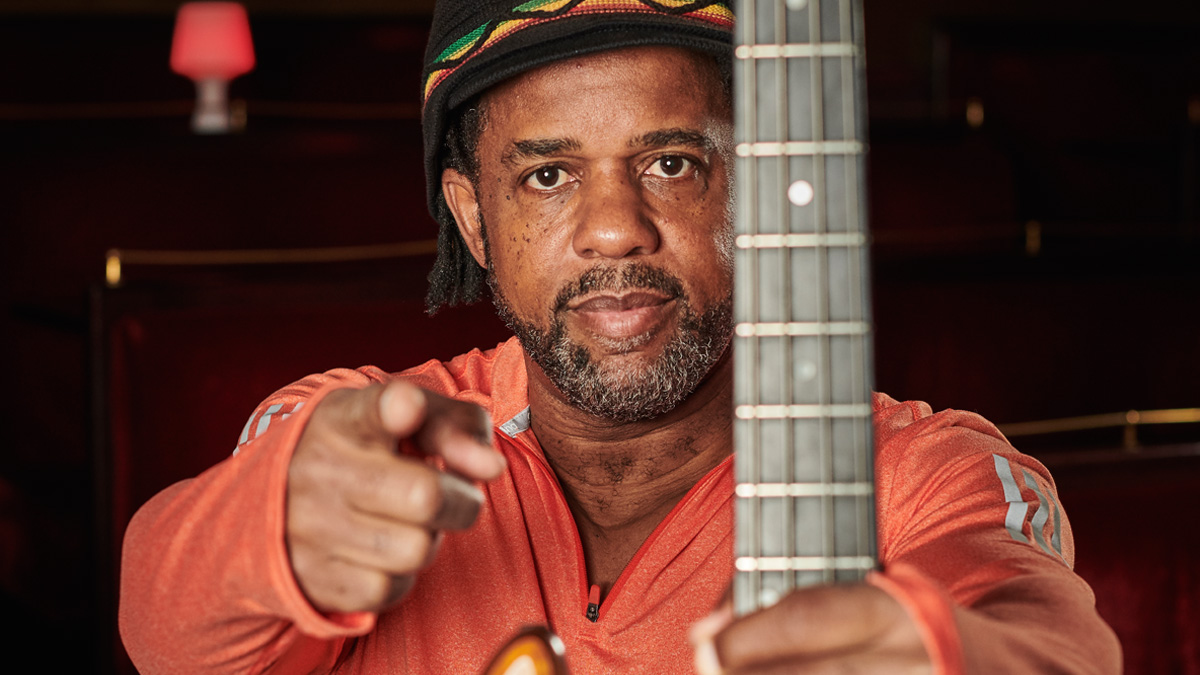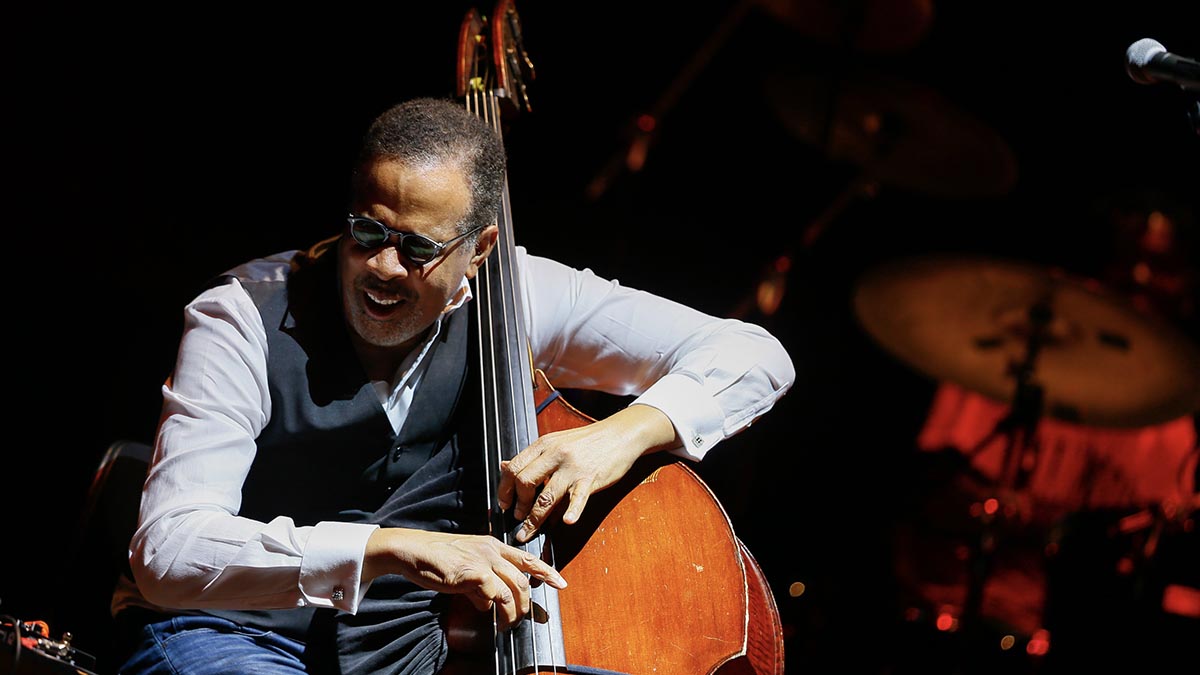"Double-thumbing is where I use my thumb for up and downstrokes, similar to using a guitar pick": Bass legends Victor Wooten and Stanley Clarke in conversation
In this classic 2008 interview, Clarke and Wooten share their musical philosophies, talk gear and unpack some of the groundbreaking techniques behind their sound

Your average bass journalist will never be a fiftieth as good as Victor Wooten or Stanley Clarke, but when you’re only interviewing one of those players, it’s possible to forget that humbling fact for a moment.
Faced with both of those world-straddling bassists, however, with their casual mention of double-thumbing here and multi-finger tapping there, and it’s an inescapable element of the conversation: these two bassists are so accomplished that the rest of us mortals might as well give up now.
I’m kidding, of course. If anything, both Clarke and Wooten inspire the rest of us to work harder and get better. Both men are immensely encouraging to their fellow bassists, offering practical tips and a dose of philosophy that demonstrates how important it is to rise above the mere metal and wood of our instrument and ascend to the more significant plane of music itself.
And there’s no better time to heed their words than now, with Stanley back on the stage with the legendary fusionists Return To Forever, and Victor releasing his latest album, Palmystery. What’s more, the pair have teamed up with Marcus Miller for what looks to be the ultimate bass album, released later this year.
Stanley, Return To Forever have just completed a sold-out tour. How did the reunion come about?
Clarke: “About two years ago, we started talking about the possibility of us getting back together. Some promoters had made attempts to get us back together again, which kind of forced us to at least start talking about it.
“Me and Chick [Corea, the late keyboard legend] met, and finally we agreed that it would be a good idea to at least try it, so we had talks. Like any band that’s been broken up a long time, there were things that people wanted to talk about – certain things that each guy wants.
Get The Pick Newsletter
All the latest guitar news, interviews, lessons, reviews, deals and more, direct to your inbox!
I used to hire whole orchestras for scoring action movies. I get off on that
Stanley Clarke
“So once we got all that out of the way, the rest was pretty easy. There are lots of promoters out there, and they all want to make money, so getting the gigs was the easiest part – and here we are! I wish we had more time to play gigs, but for the first time around this is what we’ll do.
“If it goes as well as we think it will, you never know – it might happen again next year. One never knows. We’ll record a live DVD, but as far as a new album is concerned, I guess that’s gonna depend on what happens with this tour.”
Did you play the old Return To Forever bass parts in the same way that you used to 30 years ago, or did you give them a modern spin?
Clarke: “I listened to the music and then played the bass to the songs in the way that I play now. I didn’t actually listen to the albums from start to finish, but when we were putting together our recent compilation CD, Return To Forever: The Anthology, I realized that there was a lot of music to choose from.
“There’s a lot of notes and a whole lot of parts! Some of it is ridiculously complex. I’m a better musician now, but we were all struggling to remember the parts.”
Meanwhile, Victor, you have a new album out called Palmystery, featuring a whole list of guest artists. Was it difficult to sort out the logistics?
Wooten: “I just had to take my time and get them whenever I could get them! I started recording some of the music many years ago, as far back as 2002, because I was recording this record, which is instrumental jazz, and a funk/R&B record, Soul Circus, at the same time – but I didn’t know which record I was going to release first.
“It’s mostly Fodera basses on the record. Mostly I use my Yin-Yang Fodera bass: I have two of those and I used both of them. I used a five-string on some parts, just to get a bit lower, and I also used a tenor bass, which is strung ADGC, like the top four strings of a five-string.”
You’ve got Anthony Wellington playing bass on some of the songs. Did you arrange separate bass parts beforehand, or just jam in the studio?
Wooten: “Yes, Anthony plays on Cambo and Flex. We recorded the parts at the same time because they were newer songs. We collaborate on what needs to happen.
“When it comes to my band, I have the core of the song ready and then we collaborate on the arrangements, unless somebody has a better idea, in which case they become the songwriters, too.”
You also play with a slide on bass on this album, unusually.
Wooten: “I’ve seen guitar players do it, so I borrowed a slide and tried it. It takes a little bit of getting comfortable with, because there’s a technique there, but it does work fairly well, and the bass having thicker strings actually gives it a pretty good sound.”

You’re both associated with famous signature basses.
Clarke: “I’m still using my Alembics, and then I have a company called Spellbinder that makes basses, so I used some of them, and of course I used my acoustic bass. Also, SWR made a new rig for me, that I really liked, especially for this tour.
“I have a couple of things for different situations. For theatres I have some cabinets with 15” speakers and others with two 10”s. Then, for a larger venue I have some 18”s. I’m covered for whatever I want to do.”
Wooten: “Actually, I haven’t actually played that many basses over the years. I had a Univox when I was around six years old, which would have been right around 1970. Then around 1977 I got an Alembic bass, a Series 1. Yes, the Stanley Clarke bass – he was a huge influence.”
Stanley, you’re known for playing short-scale basses. What’s their attraction for you?
Clarke: “I have both piccolo and standard Alembic basses. With the Spellbinders, I have a regular, standard-tuned bass and a tenor bass. I wanted a more melodic sound, so I could play chords on the bass.
With a lot of the larger bass guitars, when you play chords on them they just get boomy
Stanley Clarke
“The way I perceive the electric bass is maybe a little bit different to guys who grow up playing regular bass guitar, because I grew up playing acoustic bass for many years, which had very difficult fingering. I looked at the bass guitar kind of like a baby instrument, you know.
“Steve Swallow was like that as well: he played acoustic bass for many years too. With a lot of the larger bass guitars, when you play chords on them they just get boomy, and I had a lot of things musically that I wanted to do, so it was better for me to get a smaller bass.”
Tell us about your Spellbinder basses.
Clarke: “They’re lightweight instruments with a unique brace design that is flexible. The pickups are really nice. The thing about them that I like is that they have some of the qualities of the Alembic, but a little deeper, and on the standard model they actually go higher and lower.
“It’ll give you that Marcus Miller kind of sound. It’s very flexible. The more expensive model is active, and the regular is passive, which sounds good, too.”
Why did you start playing Alembics in the first place?
Clarke: “Just the clarity. Before the Alembic I was playing a Gibson EB-0, and it’s a nasty-sounding bass. It looked like a Chet Atkins guitar. Rick Turner from Alembic came to a gig I was playing and said, ‘You play really good, but your sound is awful!’
“I got mad at him, but he said ‘I have a bass for you’. I played it and bought it from him that night – I don’t know if it was a prototype or what, but I said, ‘Man, you’re not getting this back.’”
Do you play five- and six-string basses too?
Clarke: “I can, but I don’t care for it. I’m so old-school that I don’t see the need for it, but I understand... I understand. Haha!”
You play with a distinctive right-hand position in which your wrist is turned at an almost perpendicular angle to your forearm. Isn’t that uncomfortable?
Clarke: “No. There’s a couple of guys, like Victor and Marcus Miller, who always blame me for that when I see them. They saw me doing it, and so they play like that. No, it’s not uncomfortable, it’s totally normal – and you listen to Victor, and you listen to Marcus, and it’s no problem.”

What about you, Victor – what’s your trademark bass style?
Wooten: “I’m pretty famous for using a technique called double-thumbing, which is where I use my thumb to do up and downstrokes. In my mind that’s not new, because jazz guitar players do it, and also it’s similar to using a guitar pick.”
The Wes Montgomery approach?
Wooten: “Exactly! To me it’s nothing new – it’s a guitar technique. It’s not so much about having flashy techniques, it’s about feeling better and sounding better.
“Over the years the music gets simpler and less technical – but you end up saying more. It’s a natural evolution for people. When our parents get older, they say less, but when they do speak it means a whole lot more.
You can have all the ideas in the world, but if you don’t have the technique to pull them off, you’ll be frustrated
Victor Wooten
“In getting wiser and smarter, you realize other ways of saying things: Rather than filling up space, you create more space. Technique doesn’t have to be overused or complicated, but you still need good technique to say what you want. You can have all the ideas in the world, but if you don’t have the technique to pull them off, you’ll be frustrated.”
Is it correct that you started playing bass when you were only a toddler?
Wooten: “I was two or three. All my brothers played, and I’m the youngest. My first real bass was made by Univox: It looked like Paul McCartney’s Höfner violin bass. Before that, my brother took two strings off one of his electric guitars and I played that. I had to be competent right away, because the five of us played in a band.”
We hear that you two have collaborated on a new album together.
Clarke: “Me and Marcus and Victor have just about finished a record, a bass album called SMV. I think it’s gonna come out at the end of this year. It’s not what you would expect – it’s a great bass album, I think.”
How did you divide up the parts?
Clarke: “We never really looked at it that way, it’s not that clinical. A lot of us are playing together at the same time, but it’s very orchestrated, I’ll put it that way. There’s a lot of different instruments.”
Jeff Berlin told us recently that it’s important to break away from the bass guitar’s diatonic symmetry and to study asymmetrical scales. Do you agree?
Wooten: “I understand that, but I don’t agree with it. You’re only as limited as your mind is. I think the person who has something to say will figure out another way to do it.
“Look at Stanley Jordan, for example – he found a way to break out of the limitations of his instrument by playing like a piano. Like Jeff Berlin, I play chords: the bass is no more limited than a guitar. Even a piano has the notes written on it one at a time, it’s just that you use all your fingers to play chords.
“It’s not the instrument that makes music, the person makes the music – so if you feel limited, that’s okay, that’s not a problem, it’s just that I don’t feel limited.”
Stanley, you’re also known for the film soundtracks you compose. How do you approach them?
Clarke: “When I’m writing for films, because I have the information there from the film, and I know what the subject matter that we’re dealing with is, it makes the job a little easier. It’s about translating emotions into music, so you’re writing musical devices.
“It’s a real art, and I really like it. A few years ago, before the budgets came down, I used to hire whole orchestras for action movies: I really get off on that. That’s the fun part.”
Do you guys still practice?
Clarke: “Yes, absolutely. There are two parts of practicing for me. One is maintenance – you gotta maintain whatever it is that you have. Then there’s the idea of expanding and getting better, which is simpler – you just find something you can’t play, and try real hard to get it right!”
Wooten: “More than practicing, I play. You never practice speaking English, but you’re good at it. I practice a little and I play a lot.”
Can bass be truly mastered solely through practice, or is there more to it than that?
Wooten: “The thing is, music is a language, a form of expression. That’s how we use it – to express ourselves. It’s communication: Musicians use it to communicate all the time, and there are universal phrases that everybody knows.
“Some people can express themselves much better musically, and some things can be expressed much easier – but the thing is, when I was two years old, or when you were two years old, you could speak whatever your first language is very well.
“You could improvise – no-one had to tell you what to say. You could jam with professionals with no big deal. Music for me was the same, because I was learning it at the same time.”
Clarke: “Remember, the desire to play is natural. I have basses laying around in my house and I just pick them up, it’s very therapeutic, particularly the acoustic bass.
“Then again, lately there’s so many things that I do musically, that I sometimes want to have nothing at all to do with music! After this long tour, I’m probably not gonna want to hear anything to do with music…"
At some point, is it possible to transcend the instrument’s limits and reach bass nirvana?
Wooten: “That’s the goal. Having something to say that people will want to listen to is the most important thing. I never run out of inspiration, because what we talk about is life. Whatever happens, that’s what we verbalize.
“Life doesn’t stop, so if you run out of things to talk about, that’s your problem. All you gotta do is open your eyes! Music’s the same way. Now, a lot of people, when they play, sometimes they just play scales, and you can tell that all they’re talking about is music.
“They’re just playing the right scales with the right fingering – but if you take musicians like BB King and Ray Charles, they don’t care about scales, they’re telling you a story about their life experience. “I don’t claim to be right, and I’m not saying that other people are wrong, either – I’m just saying that there are many different approaches.”
Joel McIver was the Editor of Bass Player magazine from 2018 to 2022, having spent six years before that editing Bass Guitar magazine. A journalist with 25 years' experience in the music field, he's also the author of 35 books, a couple of bestsellers among them. He regularly appears on podcasts, radio and TV.
“I asked him to get me four bass strings because I only had a $29 guitar from Sears”: Bootsy Collins is one of the all-time bass greats, but he started out on guitar. Here’s the sole reason why he switched
“I got that bass for $50 off this coke dealer. I don’t know what Jaco did to it, but he totally messed up the insides!” How Cro-Mags’ Harley Flanagan went from buying a Jaco Pastorius bass on the street to fronting one of hardcore’s most influential bands











